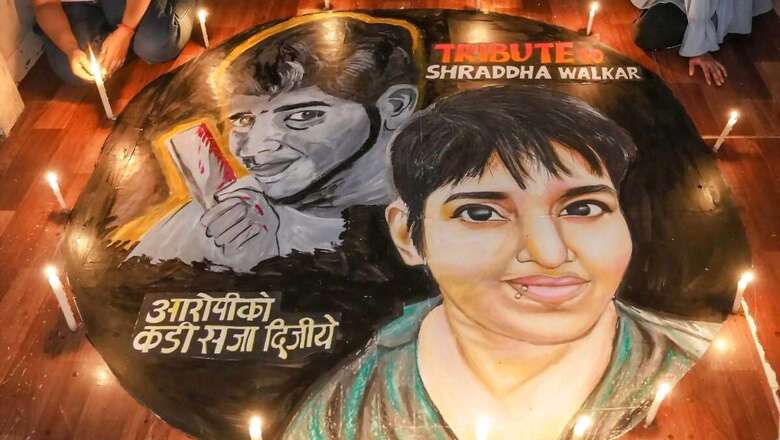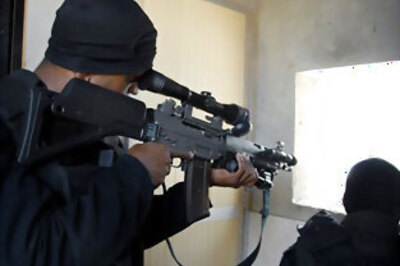
views
Maharashtra’s interfaith marriage committee was set-up to prevent another Shraddha Walkar case, MLA Mangal Prabhat Lodha said on Wednesday while addressing the state legislative assembly.
Claiming that over one lakh cases of ‘love jihad’ have occurred in Maharashtra, he said “morchas of 50,000 people are being taken out in every district of Maharashtra, are they coming out without any reason? There is a fire inside…society is troubled by the issue.”
The Women and Child Development Minister added that the state’s interfaith marriage committee is not targeting any faith, and is set up to prevent more killings. “If anyone has any questions about it (interfaith marriage committee), read the GR, then you can ask me anything…there is no word in that targeting any religion or faith. But it is the government’s responsibility to ensure that another Shraddha Walkar doesn’t happen in Maharashtra.”
महाराष्ट्रात पुन्हा एकदा श्रद्धा वालकर सारखी घटना न घडावी, ही सरकारची जबाबदारी आहे. @mieknathshinde @Dev_Fadnavis@CMOMaharashtra#InternationalWomensDay #WomensDay #NariShakti #NariShaktiForNewIndia pic.twitter.com/jiP9b4qC9e— Mangal Prabhat Lodha (@MPLodha) March 9, 2023
“For every Shraddha Walkar, every girl whose communication with her family has broken after marriage, it is the government’s responsibility to establish communication,” he added.
Lodha was replying to a debate on the issue in the Maharashtra Legislative Assembly during the ongoing Budget session. He also said that Maharashtra’s new women’s policy would be introduced in the session.
What is Maharashtra’s Interfaith Marriage Committee?
The Maharashtra government’s Interfaith Marriage Family Coordination Committee was set up by the women and child development (WCD) department in December 2022.
The 13-member committee, headed by Lodha, was set up to monitor district-level initiatives for women in inter-faith marriages who may be estranged from their families and, if necessary, provide them with assistance, as per a Government Resolution (GR).
According to the GR, the committee will provide a platform for such women and their families to avail ‘counselling’ and ‘resolve issues’. In another GR in December, the government clarified that information would be taken from complaints received by the panel regarding women in such marriages, if they are estranged from families, and a helpline set up.
The committee until January 23 had held two meetings and received complaints or information about 152 cases of interfaith marriages, as per The Indian Express. “These cases are in the form of complaints from family members, neighbours or friends, who have informed the committee members that they know of a woman who is estranged from her family due to her interfaith marriage,” Lodha told The Indian Express.
Why Was the Committee Set Up?
Lodha said that the move is aimed at avoiding a repeat of the Shraddha Walkar case. “The fact that Walkar’s family was not aware that she had died six months ago is scary…We don’t want to have another Shraddha Walkar and this is the reason why the committee is being set up to ensure women in such marriages are not away from their families,” Lodha said, as per Firstpost.
Walkar, a resident of Vasai in Maharashtra, was allegedly killed by her live-in partner Aaftab Poonawala in their Delhi flat. He allegedly chopped her body into multiple pieces before disposing of them over several weeks. Walkar had been estranged from her father, and had allegedly been in an abusive relationship with Poonawala.
Walkar’s murder came to light about six months after the incident, sparking debate around a host of issues, including abusive relationships, women’s safety and interfaith relationships that may estrange a woman from her family.
Why Women Can’t Leave Abusive Relationships
While Shraddha’s murder shook the country and sparked important conversations regarding intimate partner violence, it is not a new phenomenon. In India, the latest data from the National Crime Records Bureau (NCRB) show that of the 4,28,278 cases of crimes against women in 2021, as many as 1,36,192 cases were registered under the charge of ‘cruelty by husband or his relatives’.
Research has shown that it is difficult for women in abusive relationships, either marriage or live-in, to walk out. In Shraddha’s case, her friends revealed that she had wanted to walk out of the abusive relationship several times in the past.
Dr Nancy Pathak, an assistant professor at Delhi University and a gender rights activist, pointed to ‘victim shaming’ as one of the reasons for why women find it difficult to leave abusive relationships.
“We are conditioned to follow the traditional rules and gender roles laid down by the society. When women voice their opinion, they stray away from the traditional roles,” she told The Quint. “Society responds by victim shaming. Often the survivors are reluctant to lodge a case against their abusers because of the conditions they have witnessed growing up. The women in their families might have faced similar abuse – so they end up accepting the abuse. This becomes an endless cycle that may take generations to break free.”
Furthermore, in cases like Shraddha’s, where she was estranged from her family, it makes it even harder to seek help. Feminist activist and author Kavita Krishnan in a Facebook post in November said, “In inter caste or inter faith love/marriage, it is even harder for women to seek help for domestic violence, because the woman’s family usually disowns her. Even they merely disapprove of her relationship instead of disowning her, she hesitates to complain about her partner for fear it will confirm her family’s prejudices.”
What Can We Do to Help?
Krishnan said that a life could be saved if people took notice of domestic violence against women and took action to stop it. “Usually boyfriends/husband murder women after long periods of domestic violence. If only people reacted to domestic violence and took action to stop it, it could save women’s lives. Sadly domestic violence is largely seen as a “private matter”, a “lovers’ quarrel” and hardly anyone interferes,” she said.
“We have to realise that many women in that situation will not opt for police intervention, and even if they leave the marital/shared home they are likely to return, many many times, before they actually make a complete break with the abusive partner,” she said, adding that it is our job as ordinary people to be there for victims of domestic violence and let them decide how much help they need.
Protests Against the Committee
Several citizens’ groups and and political parties have opposed Maharashtra’s interfaith marriage committee, alleging that its sole intention was to harass members of particular committee and that it was a precursor to bringing in an anti-conversion law in Maharashtra.
Women’s and citizen’s groups along with opposition political parties have formed a committee called ‘Salokha Samiti’ (harmony committee) to demand the withdrawal of the interfaith panel. Alleging that the government’s intention was solely to harass people from a particular community, they said the interfaith marriage committee was a precursor to bringing in an anti-conversion law in Maharashtra.
The activists, supported by the Congress, NCP, Shiv Sena (UBT), Samajwadi Party, Vanchit Bahujan Aghadi, Communist Party of India and Communist Party of India (M), are planning to start agitations against the decision, the Hindustan Times reported in February.
Read all the Latest Explainers here
















Comments
0 comment